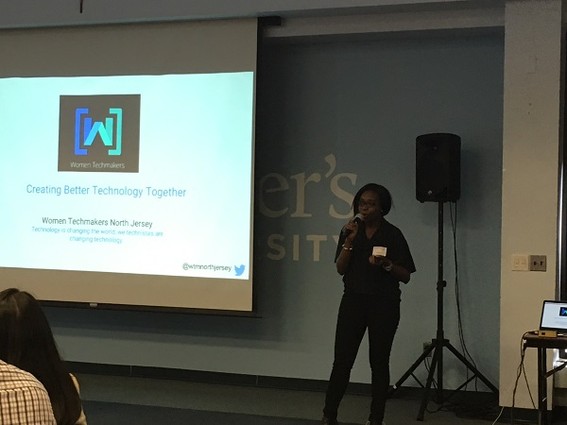Female Techmakers Give Powerful Advice to Other Women at Techmakers U

At the Techmakers U Conference on April 3, a panel of female entrepreneurs gave advice to the women and men gathered there for a half day of informative discussions and technology workshops.
In her introduction, Sylvia Wandahwa, one of the event organizers, talked about how Techmakers U had evolved. “Women are not that well-represented” in tech, she said. “There is a diversity gap, so Google initiated ‘Women Techmakers,’ and we are the North Jersey band. The goal is to create better technology together, when you have both male and females in one combined entity.”
The day was hosted by Women Techmakers North Jersey and supported by Google; the Ignite Institute at St. Peters University (Jersey City); and by a number of other New Jersey sponsors.
First on the agenda was a panel entitled “Celebrate the Process of Getting Things Done.” It was moderated by Chrishan Wright, founder of Propel Media Group (Maplewood), and Aiko Thurlow, founder of ToolMuse (Glen Gardner).
The speakers were Vajaah Parker, director of digital strategy at the Web Development Group (Washington, D.C.); Zahra Amanpour, founder of Indiegrove (Jersey City), a coworking community; and Alexandra Wolf, founder and CEO of #BOSSBABE INC. (Berkeley, Calif.), a lifestyle brand that teaches business-minded millennial women how to take personal responsibility for their lives.
The panelists began by discussing the prospects for women in tech, including female tech founders.
Learn coding to hold the keys to the future
A lot of opportunities exist for women in Web development, Parker said, but, more importantly, women startup founders should learn more about coding, so they won’t be at the mercy of developers to make their businesses thrive.
It’s not about learning to code for someone else, she said. It’s about understanding what’s behind what you want to create. “The more you can hold the keys in your own hand, the more power you will have, no matter what you are setting out to do,” she said.
“I don’t think that many of my online followers realize the potential of building an online business,” Wolf said. “That’s where the power of branding comes in.” #BOSSBABE makes the process of building an email list and other tasks exciting, she added. Wolf has also helped many of her followers build an online presence. “We are in a very experimental time, and if you want to get anything done, you have to build it online,” she told the group.

“We have a lot of stereotypes to overcome as women,” Amanpour noted, among them the notion that women mainly excel at passive skills like being good listeners. Women have to strike out beyond the stereotypes, she said, and build camaraderie with other women.
When asked how to cross the gap between wanting to start something and actually starting it, the panelists had a variety of answers.
Crunch the numbers and treat your business seriously
Women tend to shy away from the planning they’ll have to do and the numbers they’ll have to understand before starting a business, Amanpour stated. You can’t do this. “You have to really crunch the numbers and be realistic about what those numbers tell you,” she said.
Invest in your business and take it on as a real business from the first day, she advised. You see men who quit their jobs and “come into Indiegrove, and they say, ‘I’ve got to get a membership today. I just quit my job.’ Women will be like, ‘I can’t really justify spending $350 dollars a month yet, because I haven’t started my business and I haven’t made any revenue yet.’ So there’s a lot of hesitation in terms of women investing in themselves.”
When you start your business, really do your due diligence, Parker advised. Understand the competitors in your field, and make sure you can justify your business model. Do the research to understand your approach to your business and how you’ll make it happen. Be prepared to think hard, and be honest about your revenue potential, she added.
Look for niche markets for online businesses
Don’t underestimate the niche audiences that are available in the market, Wolf said. Parse the market. “I wasn’t just trying to reach business women. I was trying to reach millennial women who were interested in makeup and fashion.” Don’t be afraid to get specific. Adding that extra layer of specificity is what made #BOSSBABE go viral, she noted. “One of the things I hear from entrepreneurs is ‘I don’t want to push people away.’ You are actually pushing them away when you go too broad.”

The panelists talked a bit about marketing to millennials. If it takes you more than a sentence to explain what you are talking about, millennials are gone, said Wolf. She advised founders who want to connect with the millennial consumer to pay attention to how they do everything on Snapchat.
Millennials have access to more information than any previous generation, Amanpour said. They are open to growth and change and to new things. It’s important to keep up with them and cater to that sophistication and high level of information. “When a younger person comes into a coworking space, they have an expectation of what it is supposed to look like, feel like, smell like, everything,” she added, and it’s important to meet those expectations.
“I am encouraged,” Parker said, “because millennials seem to be coming full circle. A lot of conversations start online, but they don’t also end online. There is an opportunity in the market to build on concepts like Meetup.com that actually get you connecting online, and then you meet face to face.” There are also opportunities for brick-and-mortar stores now, she added. People look and research online, but they now want to go to a store and actually look at the product.

